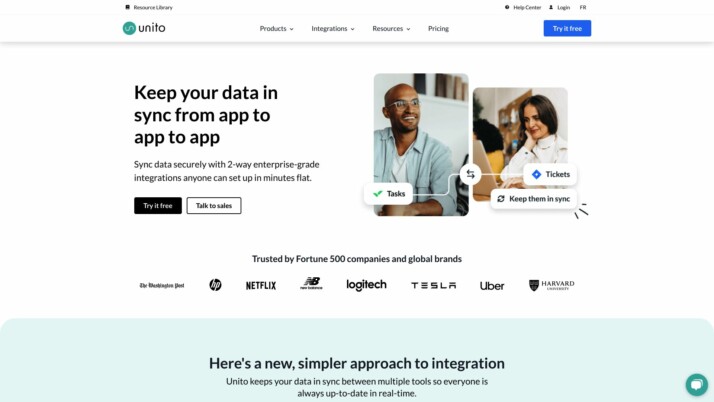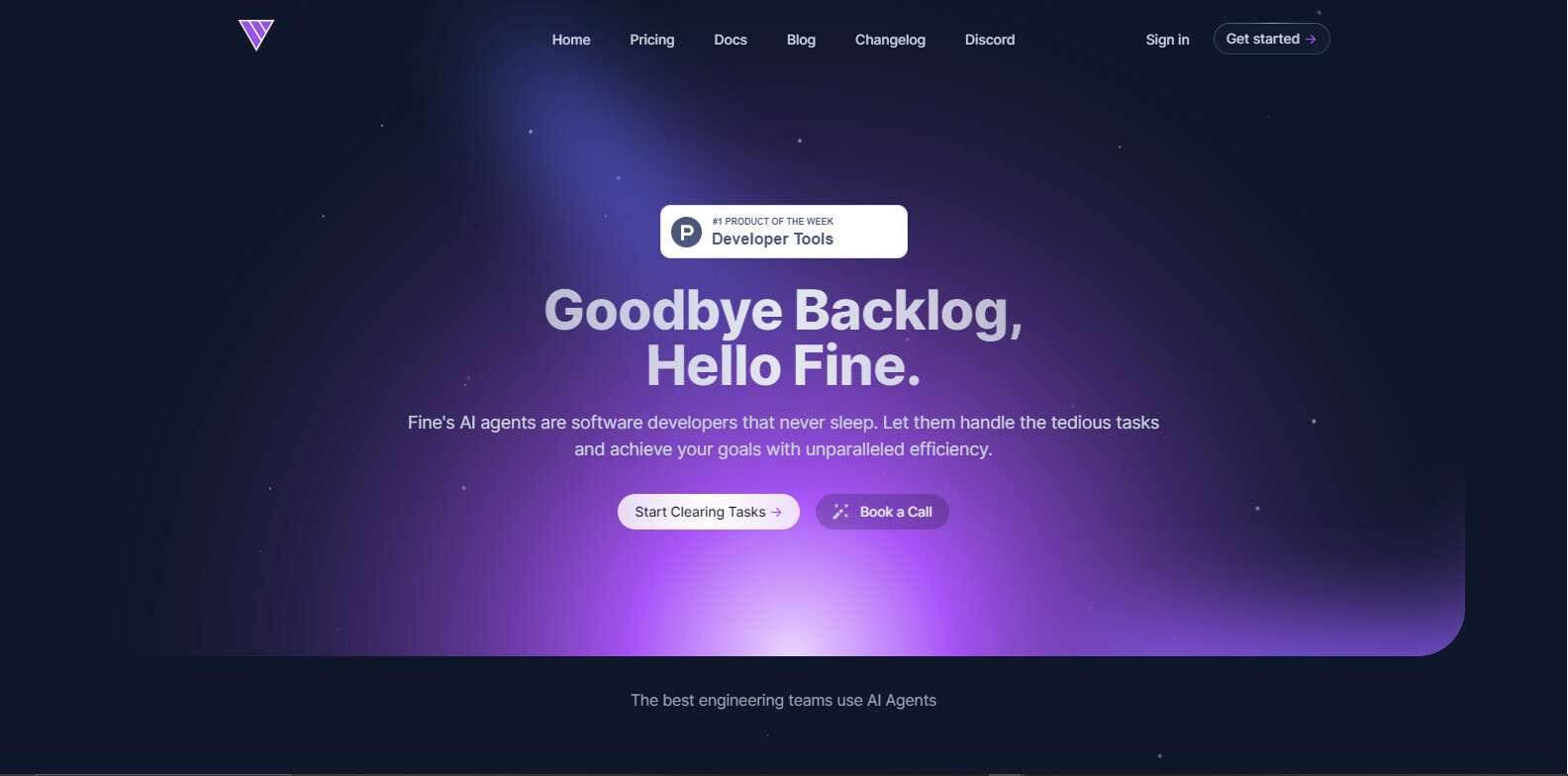Unito vs. Fine AI: Comparing AI Workflow Solutions
AI-powered tools are revolutionizing how businesses operate, automate workflows, and enhance productivity. This comparison explores Unito’s data synchronization platform, Fine AI’s software development automation, and SmythOS’s comprehensive AI agent solution. We’ll examine how each addresses modern workflow challenges, evaluating their features, scalability, and target use cases. By the end, you’ll understand which platform best suits your needs for streamlining operations, whether you’re a developer seeking code automation, a business leader aiming to break down tool silos, or an entrepreneur looking to harness AI’s potential. Discover how these innovative solutions can transform your work processes and drive efficiency in today’s AI-driven landscape.
Unito Overview
Unito provides a powerful integration platform designed to synchronize data across various business tools. The company’s Sync Platform enables seamless connections between popular applications like Asana, Jira, Trello, and GitHub, facilitating efficient collaboration across teams and departments.


Unito’s core offering revolves around real-time two-way synchronization, ensuring data consistency across connected tools. This feature allows teams to work in their preferred environments while maintaining up-to-date information across the organization. The platform also supports historical syncing, integrating past data to provide comprehensive project insights.
Unito’s core offering revolves around real-time two-way synchronization, ensuring data consistency across connected tools.
A standout feature of Unito is its visual workflow designer, which allows users to build and customize integrations without coding knowledge. This no-code approach democratizes workflow automation, enabling teams to create complex syncs tailored to their specific needs. The platform’s deep field configuration options further enhance its flexibility, allowing users to align data syncing with their unique requirements.
Unito prioritizes security and scalability, offering enterprise-level features such as SOC II Type 2 certification and the ability to sync thousands of tasks. The platform’s self-serve setup empowers users to independently configure and initiate integrations, reducing reliance on IT departments. Additionally, Unito provides workflow drafts and duplication capabilities, streamlining the process of creating and managing multiple workflows.
While Unito excels in data synchronization and workflow automation, it’s important to note that the platform does not offer AI agent capabilities or advanced features like autonomous decision-making or problem-solving. Its focus remains on bridging the gap between different tools and eliminating data silos, rather than providing AI-driven functionalities.
Fine AI Overview
Fine AI offers an open-source platform for building customized AI agents that automate software development tasks. The platform empowers developers to create specialized agents for backend, frontend, and testing, capable of understanding specifications and making coherent changes across codebases.
Fine AI focuses on transforming the developer workflow by eliminating repetitive tasks, allowing engineers to concentrate on complex problem-solving. The platform’s agent delegation model aims to boost productivity and restore the joy of building software by automating tedious coding processes.
Fine AI focuses on transforming the developer workflow by eliminating repetitive tasks, allowing engineers to concentrate on complex problem-solving.


Key features of Fine AI include a desktop app for configuring workflows and agents, a library of ready-made agents for common tasks, and the ability to run agents locally on repositories. The platform also provides notebooks for authoring technical specifications, enabling developers to clearly communicate their requirements to the AI agents.
Fine AI’s vision extends beyond individual productivity, promoting human-AI collaboration for collective problem-solving. By tailoring agents to developers’ specific technology stacks, Fine AI differentiates itself from general-purpose AI assistants. This approach aims to provide more targeted and effective automation within the development process.
By tailoring agents to developers’ specific technology stacks, Fine AI differentiates itself from general-purpose AI assistants.
However, Fine AI’s current public beta focuses on core automation workflows, which may limit its capabilities compared to more established platforms. Additionally, the reliance on local repositories for agent execution could potentially restrict scalability for larger teams or distributed development environments.
Feature Comparison
Unito and Fine AI offer distinct approaches to workflow automation and AI integration in software development. Unito excels in data synchronization across various business tools, providing real-time two-way sync capabilities. Its visual workflow designer allows users to create complex integrations without coding knowledge. In contrast, Fine AI focuses on AI-powered automation of software development tasks, offering specialized agents for backend, frontend, and testing.
While Unito provides enterprise-level security features like SOC II Type 2 certification and OAuth2 authentication, Fine AI’s security measures are less clearly defined in the available information. Unito’s platform scales to sync thousands of tasks, demonstrating robust bulk work capabilities. Fine AI, being in public beta, may have limitations in scalability for larger teams or distributed environments.
Unito’s strength lies in its deep integration ecosystem and customizable field configurations, whereas Fine AI differentiates itself with AI agents tailored to specific technology stacks. This specialized approach potentially offers more targeted automation within the development process, but may lack the broader application integration that Unito provides across various business tools.
Feature Comparison Table
| Unito | Fine AI | SmythOS | |
|---|---|---|---|
| CORE FEATURES | |||
| Hosted Agents (Dev, Production) | ✅ | ❌ | ✅ |
| Environments (Dev, Production) | ✅ | ❌ | ✅ |
| Visual Builder | ✅ | ❌ | ✅ |
| No-Code Options | ✅ | ❌ | ✅ |
| Autonomous Agents | ❌ | ✅ | ✅ |
| Explainability & Transparency | ✅ | ❌ | ✅ |
| Debug Tools | ✅ | ❌ | ✅ |
| Multimodal | ❌ | ❌ | ✅ |
| Multi-Agent Collaboration | ✅ | ❌ | ✅ |
| Human-AI Interaction | ❌ | ✅ | ✅ |
| Audit Logs for Analytics | ✅ | ❌ | ✅ |
| Agent Work Scheduler | ❌ | ✅ | ✅ |
| SECURITY | |||
| Constrained Alignment | ✅ | ❌ | ✅ |
| Data Encryption | ✅ | ❌ | ✅ |
| OAuth | ✅ | ❌ | ✅ |
| IP Control | ❌ | ❌ | ✅ |
| COMPONENTS | |||
| Foundation AIs | ❌ | ❌ | ✅ |
| Huggingface AIs | ❌ | ❌ | ✅ |
| Zapier APIs | ✅ | ❌ | ✅ |
| All other APIs, RPA | ✅ | ❌ | ✅ |
| Classifiers | ❌ | ❌ | ✅ |
| Logic | ❌ | ✅ | |
| Data Lakes | ❌ | ❌ | ✅ |
| DEPLOYMENT OPTIONS (EMBODIMENTS) | |||
| Deploy as API | ✅ | ❌ | ✅ |
| Deploy as Webhook | ❌ | ❌ | ✅ |
| Staging Domains | ❌ | ❌ | ✅ |
| Production Domains | ✅ | ❌ | ✅ |
| API Authentication (OAuth + Key) | ✅ | ❌ | ✅ |
| Deploy as Site Chat | ❌ | ❌ | ✅ |
| Deploy as Scheduled Agent | ❌ | ❌ | ✅ |
| Deploy as GPT | ❌ | ❌ | ✅ |
| Scalability | ✅ | ❌ | ✅ |
| DATA LAKE SUPPORT | |||
| Hosted Vector Database | ❌ | ❌ | ✅ |
| Sitemap Crawler | ❌ | ❌ | ✅ |
| YouTube Transcript Crawler | ❌ | ❌ | ✅ |
| URL Crawler | ❌ | ❌ | ✅ |
| PDF Support | ❌ | ❌ | ✅ |
| Word File Support | ❌ | ❌ | ✅ |
| TXT File Support | ❌ | ❌ | ✅ |
Best Alternative to Unito and Fine AI
SmythOS stands out as the superior alternative to Unito and Fine AI, offering a comprehensive AI automation platform that combines the best of both worlds while surpassing them in key areas. Our platform delivers unparalleled flexibility, feature-richness, and ease of use for businesses seeking to harness the power of AI.
Unlike Unito’s focus on data synchronization or Fine AI’s specialized development tools, SmythOS provides a complete ecosystem for creating, deploying, and managing AI agents across diverse use cases. We offer a visual drag-and-drop interface that simplifies agent creation without sacrificing advanced capabilities. This approach democratizes AI development, allowing both technical and non-technical users to build sophisticated solutions.
SmythOS provides a complete ecosystem for creating, deploying, and managing AI agents across diverse use cases.
SmythOS excels in its extensive integration capabilities, supporting a wide array of APIs, AI models, and third-party services. This versatility ensures seamless incorporation into existing workflows and systems, addressing a limitation found in both Unito and Fine AI. Our platform’s ability to handle multimodal inputs, including text, voice, and images, opens up possibilities for more complex and nuanced AI applications.
We prioritize scalability and performance, allowing users to effortlessly grow their AI solutions from small prototypes to enterprise-level deployments. SmythOS offers robust security features, including data encryption and OAuth support, addressing the enterprise-grade security needs that Unito provides while surpassing Fine AI’s offerings in this area. Additionally, our platform includes advanced debugging tools, explainability features, and comprehensive analytics, empowering users to refine and optimize their AI agents continuously.
By choosing SmythOS, users gain access to a future-proof platform that combines the strengths of Unito and Fine AI while offering unique advantages. Our commitment to ongoing innovation ensures that your AI solutions will remain at the cutting edge, driving efficiency and unlocking new possibilities across your organization.
Conclusion
Unito and Fine AI offer unique approaches to workflow automation and AI integration, each with distinct strengths. Unito excels in data synchronization across various business tools, providing real-time two-way sync capabilities and a visual workflow designer. Fine AI focuses on AI-powered automation of software development tasks, offering specialized agents for backend, frontend, and testing.
However, SmythOS emerges as the superior choice, combining the best of both worlds and offering additional advanced features. Our platform provides a comprehensive solution for creating and deploying AI agents with unparalleled flexibility and power. SmythOS’s drag-and-drop interface allows users to build complex AI workflows without extensive coding knowledge, democratizing AI development for a broader audience.
Unlike Unito and Fine AI, SmythOS offers multi-agent orchestration, enabling teams of AI agents to collaborate on complex tasks. This feature enhances efficiency and scalability, surpassing the capabilities of both competitors. Additionally, our platform’s versatile deployment options, including integration with major cloud services and popular AI platforms, ensure seamless integration into existing systems.
To experience the future of AI automation and unlock unprecedented productivity gains, create a free SmythOS account today. Our platform offers unlimited agents and a risk-free trial, allowing you to explore the full potential of AI-driven workflow automation. Discover our diverse range of AI-powered agent templates and start revolutionizing your business processes with SmythOS.
Last updated:
Disclaimer: The information presented in this article is for general informational purposes only and is provided as is. While we strive to keep the content up-to-date and accurate, we make no representations or warranties of any kind, express or implied, about the completeness, accuracy, reliability, suitability, or availability of the information contained in this article.
Any reliance you place on such information is strictly at your own risk. We reserve the right to make additions, deletions, or modifications to the contents of this article at any time without prior notice.
In no event will we be liable for any loss or damage including without limitation, indirect or consequential loss or damage, or any loss or damage whatsoever arising from loss of data, profits, or any other loss not specified herein arising out of, or in connection with, the use of this article.
Despite our best efforts, this article may contain oversights, errors, or omissions. If you notice any inaccuracies or have concerns about the content, please report them through our content feedback form. Your input helps us maintain the quality and reliability of our information.
